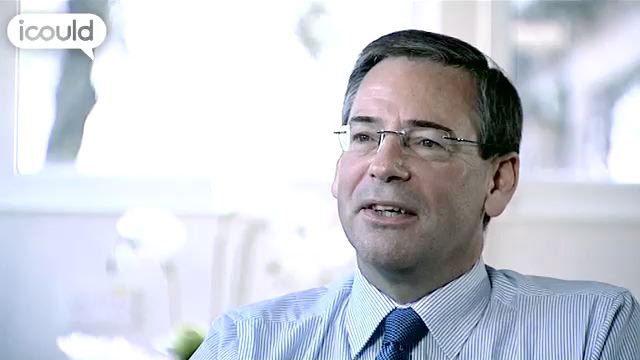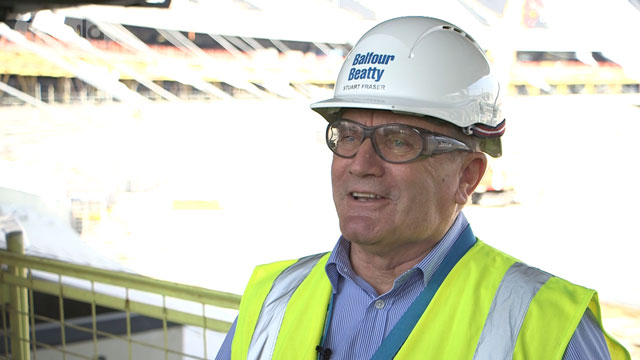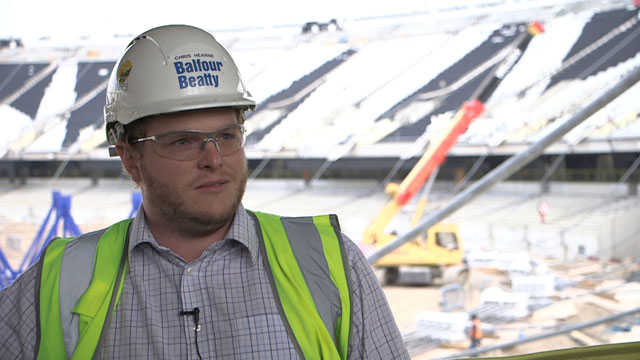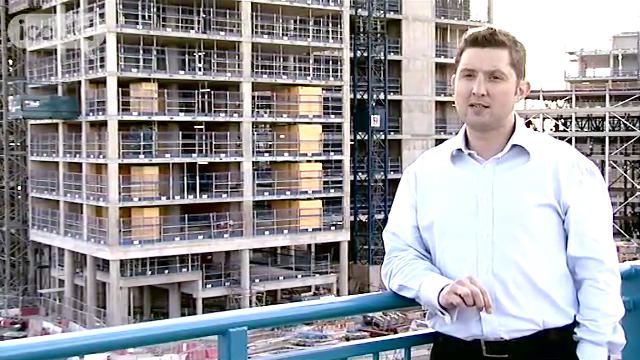Package Manager
Balfour Beatty
|
Time Code |
INTERVIEW WITH CHRIS HEARNE – BALFOUR BEATTY |
|
00:02 |
My name’s Chris Hearne, I work for Balfour Beatty. I’m a package manager here at the Olympic Stadium Transformation Project. |
|
00:07 |
Package manager, it’s sort of looking after the day to day running of the smaller elements of the job, so it’s not looking after the project as a whole, it’s the different packages that make up the job, so my packages have and do include piling works, reinforced concrete, a lot of ground beams and pile caps, to hold the roof up and also some works to transform the bridges, to make those more in keeping with the permanent bridges that we’ve got around the park. |
|
00:39 |
I joined Balfour Beatty from university. I studied civil engineering at university. Before that I studied mainly sort of science and maths at A Level, so I did physics, maths, further maths and one other. Geography? So obviously the physics and maths one are more prominent in my mind than the geography one, these days. And then I joined Balfour Beatty straight after graduating university. Started as a site engineer, so setting things out and then worked my way up to a section engineer, so you’re looking after more areas, more responsibility and then to a package manager, so I have engineers working for me, doing what I used to do. |
|
01:25 |
When thinking about the qualities and attributes that you want for an apprentice joining the apprenticeship scheme, I think the key ones as personal drive and motivation. Commitment for the apprentice or for me as a mentor. If I’ve said I’m going to do something, I’m going to make sure I’ve done that, yeah that’s the commitment I make to the apprentice and so we need that back from the apprentices and as I say, a bit of drive and motivation, just to manage their own time to meet the goals. |
|
01:57 |
Through the course of the mentoring scheme, the way you see the apprentices develop, they gain a lot more confidence in themselves and also their abilities. A lot of the people on the scheme last time had already been involved in construction on the Olympic Park to some extent. But they just gained a bigger understanding, a greater awareness of what was going on and, as I said, the personal attributes, the confidence, coming out of their shell a little bit, a lot more easier to talk to and aware of what they know and what they can bring to the table. |
|
02:32 |
On this project at the moment, I mean we’ve got a huge range of different trades working. We’ve got from groundworkers, who are sort of the guys digging the holes. We’ve had steel fixers and the guys placing the concrete and the reinforced concrete works. Steel erectors, the massive bits of steel that go into forming the new roof. There’s a lot of welding that goes involved in that. Painters, pipelayers, bricklayers, people building dryline plasterboard walls. You know, this job’s got everything, yeah, it’s the full spectrum of trades associated with the construction industry. |
|
02:07 |
There’s a wide range of projects and trades that you can do and there is the opportunity within the company to transfer from one area to another, if you wanted to specialise in certain types of jobs or even if you wanted to focus on more of a regional side of things, instead of going from the major projects where you kind of follow where the work is. If the sort of practical experiences, the apprenticeships and things like that, they’re a great benefit if you get offered these schemes, take them, grab them with both hands and fully maximise them because I’ve seen the difference it can make to people who have gone through a mentoring scheme and apprenticeship and you do come out a much more rounded individual afterwards than when you start the scheme. |
|
03:53 |
No days are the same. Some days I have to spend a lot of time at the desk, going through programmes and looking at work that’s coming up. Other days I can be out on site, problem solving, looking at what issues we’ve got and how we’re going to resolve those on site. So it’s a great variety, you’re not stuck at a desk all day. I was at the Invictus Games a couple of weeks ago and I was on the South Lawn watching the closing ceremony and over my left hand shoulder I had the Aquatic Centre, where I’d spent the last four years, over the right hand shoulder I had the Olympic Stadium, where I’m working now and it was just, it was a strange feeling that I can’t describe and I don’t think you’ll ever get again. Just a, yeah, really, it was a proud moment, that one. |
|
04:37 |
END |
“You’re not stuck at a desk all day long.” Chris joined Balfour Beatty as a site engineer, straight from university. He worked on the construction of the Acquatics Centre and is now in charge of a package of works to transform the Olympic Stadium.
More information about Production managers and directors in construction
The UK average salary is £29,813
There are 37.5 hours in the average working week
The UK workforce is 47% female and 53% male
Future employment
- Liaises with other managers to plan overall production activity and construction activities, sets quality standards and estimates timescales and costs
- Receives invitations to tender, arranges for estimates and liaises with client, architects, Chartered architectual technologists and engineers for the preparation of contracts
- Plans, directs and co-ordinates the construction and maintenance of civil and structural engineering works, including demolition, pipelines and pilings
- Receives reports upon work in progress to ensure that materials and construction methods meet with specifications and statutory requirements and that there are no deviations from agreed plans











